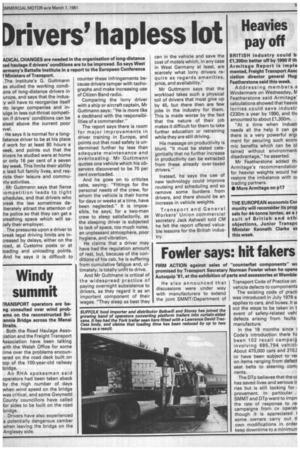rivers' hapless lot
Page 7

If you've noticed an error in this article please click here to report it so we can fix it.
ADICAL CHANGES are needed in the organisation of long-distance )ad haulage if drivers' conditions are to be improved. So says West iermany's Battelle Institute in a report to the European Conference f Ministers of Transport.
The Institute's G. Guttmann as studied the working condions of long-distance drivers in urope, and says that the indusN will have to reorganise itself rto larger companies and inlulge in less cut-throat competion if drivers' conditions can be aised above the current poor ?vet.
He says it is normal for a longlistance driver to be at his place tf work for at least 80 hours a veek, and points out that the irivers he studied were at home or only 16 per cent of a seven lay week. This limits their ability o lead full family lives, and resricts their leisure and commuiity activities.
Mr Guttmann says that fierce ompetition leads to tight ;chedules, and that drivers who )reak the law sometimes deiberately attract the attention of :he police so that they can get a preathing space which will satisfy their employer.
The pressures upon a driver to break legal driving limits are increased by delays, either on the road, at Customs posts or at loading and unloading points. And he says it is difficult to counter these infringements because drivers tamper with tachographs and make increasing use of Citizen Band radio.
Comparing the lorry driver with a ship or aircraft captain, Mr Guttmann says: "He is more like a deckhand with the responsibilities of a commander."
The report says there is room for major improvements in driver training in Europe, and points out that road safety is undermined further by less than adequate maintenance and overloading. Mr Guttmann quotes one vehicle which his observers discovered to be 70 per cent overloaded.
And he goes on to criticise cabs, saying: "Fittings for the personal needs of the crew, for whom the vehicle is their home for days or weeks at a time, have been neglected." It is impossible, he says, for a two-man crew to sleep satisfactorily, as the sleeping driver is subjected to lack of space, too much noise, an unpleasant atmosphere, poor hygiene, and vibration.
He claims that a driver may have had the regulation amount of rest, but, because of the conditions of his cab, he is suffering from cumulative fatigue and, ultimately, is totally unfit to drive.
And Mr Guttmann is critical of the widespread practice of paying overnight subsistence to drivers, as they regard it as art important component of their wages. "They sleep as best they can in the vehicle and save the cost of motels which, in any case in West Germany at least, are scarcely what lorry drivers require as regards amenities, price, and availability."
Mr Guttmann says that the workload takes such a physical toll of drivers that most give up by 45, but there then are few jobs in the industry for them. This is made worse by the fact that the nature of their job makes it difficult for them to take further education or retraining while they are still driving.
His message on productivity is blunt. "It must be stated categorically that no further increase in productivity can be extracted from these already over-taxed drivers."
Instead, he says the use of new technology could improve routeing and scheduling and so remove some burdens from drivers, and there should be an increase in vehicle weights.
Transport and General Workers' Union commercial secretary Jack Ashwell told CM he felt the report offered valuable lessons for the British industry.
























































































































